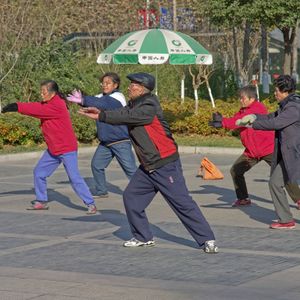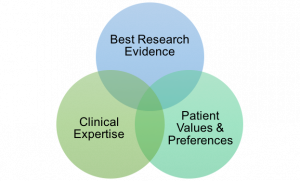What is Tai Chi
Tai chi a ‘soft’ martial arts that was developed by the ancient Chinese. It is becoming a more common exercise in the West as a means of stress management and exercise. Tai chi consists of a series of slow, controlled movements or postures, in a seated or standing position.[1] As it can be performed in sitting it is ideal for those with lower limb problems or poor balance.
Tai chi is low impact and puts minimal stress on muscles and joints thus it is ideal for all ages and fitness levels. Tai chi is especially suitable for the older adult who otherwise may not exercise.[2]
Health Benefits of Tai Chi
The benefits of Tai Chi may include:
- Decreased stress, anxiety and depression
- Improved mental health
- Improved aerobic capacity
- Increased energy and stamina
- Improved flexibility, balance and co-ordination
- Improved muscle strength and definition
Some evidence also suggests that Tai Chi may
- Enhance quality of sleep
- Enhance the immune system
- Help lower blood pressure
- Improve joint pain
- Improve symptoms of congestive heart failure
- Improve overall well-being
- Reduce risk of falls in older adults[2]
Evidence of Health Benefits of Tai Chi
Numerous published research articles have reported positive health benefits for Tai Chi. In 2015 alone, there were on average 15 new studies published each month, including Cochrane reviews.[3]
A Cochrane review published on 31 January 2019 examining the evidence for exercise regimes for preventing falls in older people living in the community, found that exercise involving balance and functional training, including Tai Chi, reduced falls compared with inactive control groups. It found that “Tai Chi” reduced the number of people experiencing falls (high‐certainty evidence) and may reduce the rate of falls (low‐certainty evidence).[4] As at least one-third of community-dwelling people over 65 years of age fall each year, with one in five requiring medical attention and around one in ten involving fractures, this is a significant outcome.[3]
The below video gives a brief insight into Tai chi for falls prevention.
[5]
A 2016 Cochrane Review of Tai Chi for chronic obstructive pulmonary disease (COPD), comparing Tai Chi with usual care, reported that Tai Chi demonstrated better functional capacity (i.e. people able to walk farther) and improved pulmonary function compared with patients undergoing usual care.[6] Likewise a 2018 systematic review on Tai Chi as an exercise for coronary heart disease patients concluded that “significant effects of Tai Chi have been found in improving aerobic endurance and psychosocial well-being among coronary heart disease patients. Tai Chi could be a cost-effective and safe exercise option in cardiac rehabilitation“.The below video gives an example of Tai Chi in use in a coronary heart rehabilitation program.
Parkinson’s disease clients can also benefit from Tai Chi. A 2012 study found that Tai chi training appears to reduce balance impairments in patients with mild-to-moderate Parkinson’s disease, with additional benefits of improved functional capacity and reduced falls.[8] The video below shows such a class in action.
A systematic review published in 2016 on Tai Chi as a treatment for chronic pain “demonstrated positive evidence regarding the effects of Tai Chi on chronic OA pain, and some beneficial evidences of Tai Chi for LBP and osteoporosis. The minimal valid duration of Tai Chi for chronic OA pain may be 6 weeks, and a longer duration of Tai Chi exercise may achieve more gains. However, there was no valid evidence on the follow-up effects of Tai Chi for chronic pain conditions.[10]
A systematic review from 2018 found good news too when it comes to Tai Chi (TC) as option for stroke rehabilitation, stating “TC has an overall beneficial effect on ADL, balance, limb motor function, and walking ability among stroke survivors, based on very low-quality evidence, and may also improve sleep quality, mood, mental health, and other motor function”.[11]
Studies on depression and Tai Chi also report benefits. Participants in Tai Chi therapy were more likely to have reductions in depression symptoms, experience depression remission and have greater improvement of physical functioning, and cognitive tests.[12]
The little Taoist Monk explains the benefits in the short video below
Physiotherapy
Tai Chi is a great exercise to prescribe in many settings and for a myriad of health conditions.
The scientifically proven benefits of practicing Tai Chi on the physical (cardiovascular, muscle strength and flexibility) as well as mental (stress relief, relaxation) strength make it a great exercise. As shown above in only a few examples of chronic conditions Tai Chi can be utilised by physiotherapists in a variety of settings. It is a safe and effective exercise which is of particular importance when treating patients with chronic pain.
References
- ↑ Better health channel. ↑ 2.02.1 Mayo clinic ↑ 3.03.1 Your health Your choice ↑ Sherrington C, Fairhall NJ, Wallbank GK, Tiedemann A, Michaleff ZA, Howard K, Clemson L, Hopewell S, Lamb SE. ↑ Mayo Clinic. Mayo clinic minute- Tai Chi keeps seniors on their feet. Available from: ↑ Ngai SP, Jones AY, San Tam WW. ↑ Swansea bay NHS TV. Tai chi helps cardiac patients. Available from: ↑ Li F, Harmer P, Fitzgerald K, Eckstrom E, Stock R, Galver J, Maddalozzo G, Batya SS. ↑ Beth Israel Deaconess Tai Chi for Parkinson’s Available from: ↑ Kong LJ, Lauche R, Klose P, Bu JH, Yang XC, Guo CQ, Dobos G, Cheng YW. ↑ Lyu D, Lyu X, Zhang Y, Ren Y, Yang F, Zhou L, Zou Y, Li Z. ↑ Psychiatric times. ↑ LFA Tai Chi What Are The Main Benefits To Your Health Practicing Tai Chi Available from: function gtElInit() { var lib = new google.translate.TranslateService(); lib.setCheckVisibility(false); lib.translatePage('en', 'pt', function (progress, done, error) { if (progress == 100 || done || error) { document.getElementById("gt-dt-spinner").style.display = "none"; } }); }


